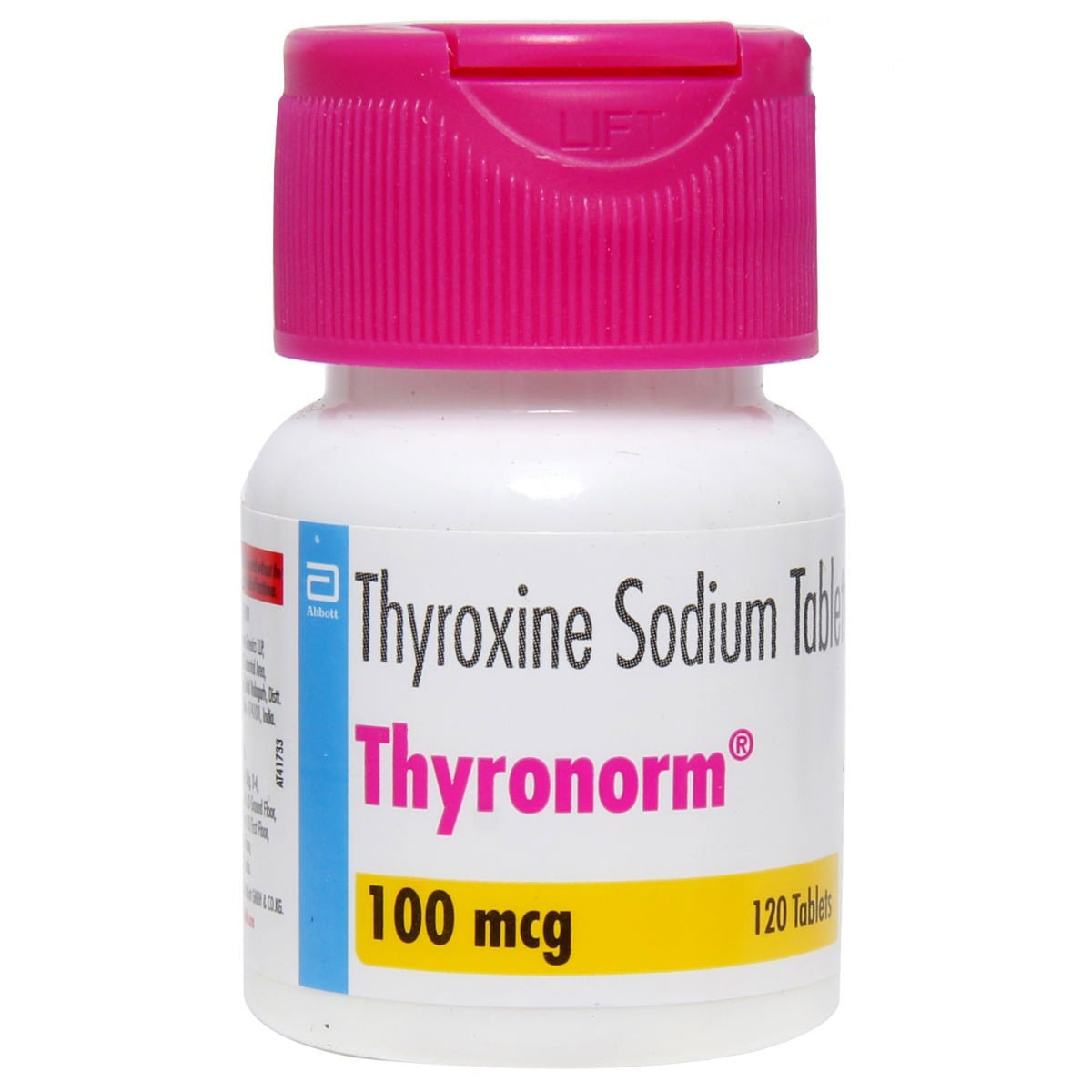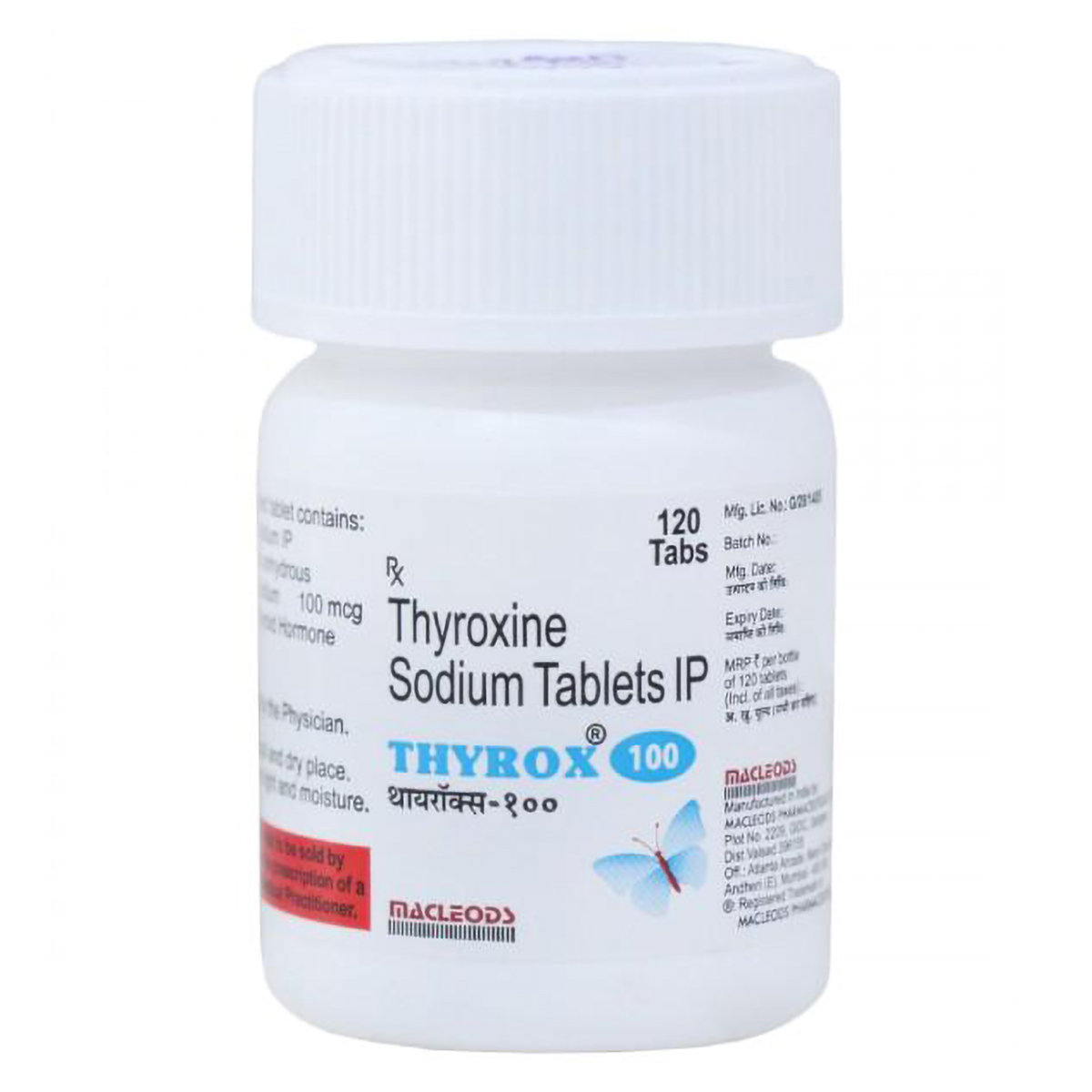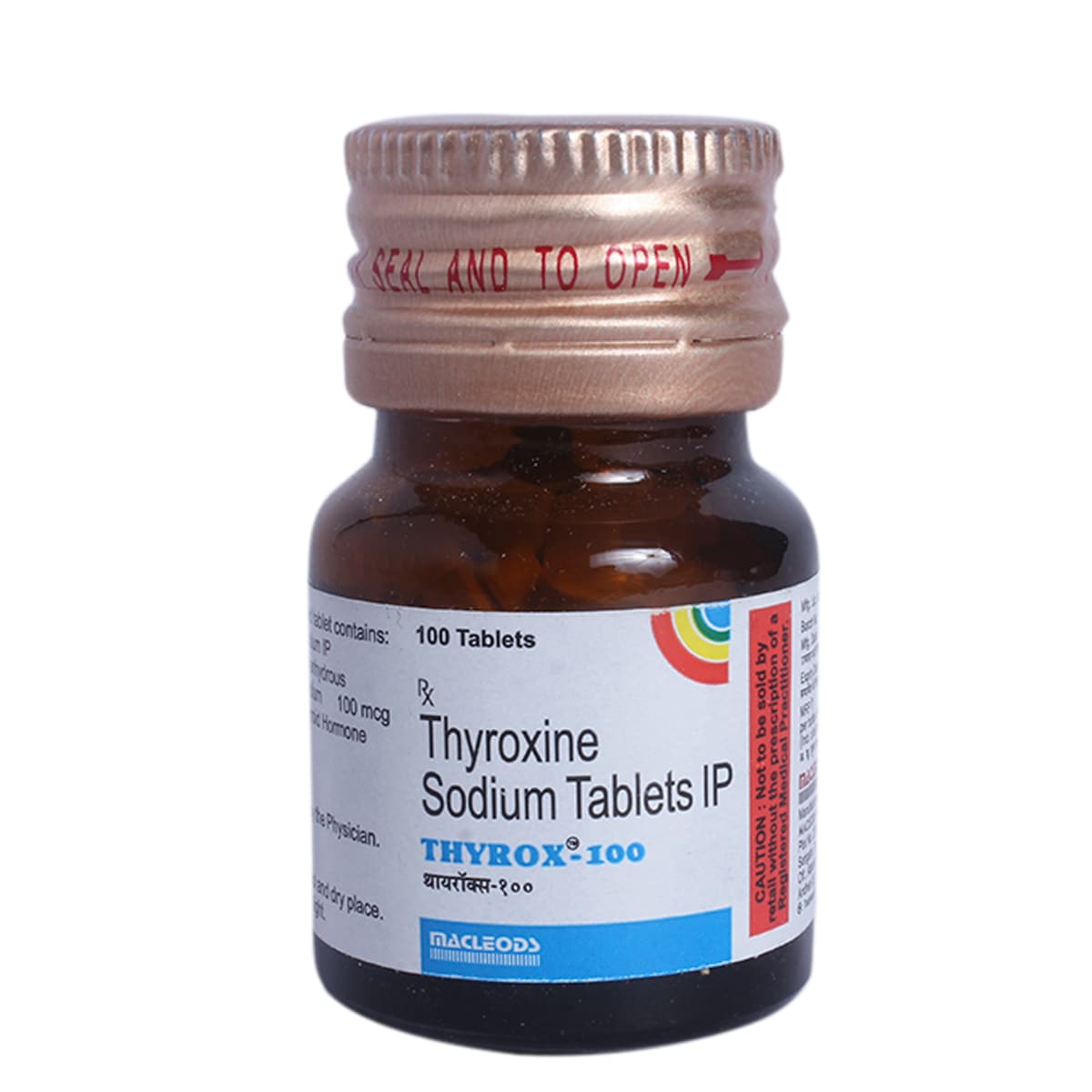- Home
- Thyroxinol-100Mcg Tablet
Thyroxinol-100Mcg Tablet Substitute
Thyroxinol-100Mcg Tablet Substitute
Medicine Composition:
THYROXINE SODIUM-100MCGAll Substitutes & Brand Comparisons
RX
Thyronil-100 Tablet 100's
East West Pharma India Pvt Ltd
₹109
(₹0.98 per unit)
30% CHEAPERRX
Out of StockThyroxium 100Mcg Tablet 100'S
Elder Pharmaceuticals Ltd
₹125
(₹1.13 per unit)
20% CHEAPERRX
Out of StockThycora 100 mcg Tablet 100's
Corazon Pharma Pvt Ltd
₹125
(₹1.13 per unit)
20% CHEAPERRX
Out of StockThyrozest 100 mcg Tablet 100's
Bencure Life Sciences Pvt Ltd
₹131
(₹1.18 per unit)
16% CHEAPERRX
Rethyro 100 mcg Tablet 120's
Tas Med India Pvt Ltd
₹165.5
(₹1.24 per unit)
12% CHEAPERRX
Thyroneed 100 Tablet 120's
Mankind Pharma Pvt Ltd
₹166
(₹1.25 per unit)
11% CHEAPERRX
Thyrocip 100 Tablet 120's
Cipla Ltd
₹166
(₹1.25 per unit)
11% CHEAPERRX
Thyrose 100 MCG Tablet 120's
Prevego Healthcare & Research Pvt Ltd
₹166
(₹1.25 per unit)
11% CHEAPERRX
Thyronorm 100 mcg Tablet 120's
Abbott India Ltd
₹168.5
(₹1.26 per unit)
11% CHEAPERRX
Thyrox 100 mcg Tablet 120's
Macleods Pharmaceuticals Ltd
₹168.5
(₹1.26 per unit)
11% CHEAPERRX
ThiroAce 100 Tablet 100's
Morepen Laboratories Ltd
₹140.5
(₹1.27 per unit)
10% CHEAPERRX
Thynice 100 Tablet 100's
Crestige Life Care
₹143
(₹1.29 per unit)
9% CHEAPERRX
Thyroxium 100 mcg Tablet 120's
Elder Pharmaceuticals Ltd
₹177
(₹1.33 per unit)
6% CHEAPERRX
Out of StockThyroget-100 Tablet 120's
Divine Savior Pvt Ltd
₹177
(₹1.48 per unit)
4% COSTLIERRX
Thyrox 100 mcg Tablet 100's
Macleods Pharmaceuticals Ltd
₹168.5
(₹1.52 per unit)
7% COSTLIER

When Should You Consider Switching from Thyroxinol-100Mcg Tablet ?
Patients may explore substitutes in the following scenarios:
- High monthly cost of Thyroxinol-100Mcg Tablet
- Non-availability in local pharmacies
- Generic recommendation by a doctor
- Side effects or better tolerability with alternatives
What to Know Before Switching
Before you switch from Thyroxinol-100Mcg Tablet to another medicine, here are some important points to keep in mind:
Same salt, different brands:
Most substitutes contain the same active ingredient - THYROXINE SODIUM-100MCG, but the fillers, coating, or manufacturing quality may vary slightly.
Consult your doctor first:
Even if the salt is the same, your doctor can confirm if the substitute is right for your condition, dosage, and health history.
Watch out for allergies or reactions:
Some people may react differently to certain brands due to inactive ingredients. If you notice any side effects, inform your doctor immediately.
Price ≠ effectiveness:
A lower-priced substitute doesn't mean it's less effective. Many generic medicines work just as well as branded ones.
Check the dosage form and strength:
Always match the substitute’s strength (e.g., 5mg, 10mg) and form (tablet, capsule, syrup) with what your doctor prescribed.
Uses
Medicinal Benefits
Thyroxinol-100Mcg Tablet is a synthetic thyroid hormone that is prescribed for the treatment of underactive thyroid (hypothyroidism). Thyroxine is the important hormone released by the thyroid gland into the bloodstream. It plays an important role in the functioning of the heart, digestion, muscles, and brain development. Thyroxinol-100Mcg Tablet acts in the same manner as natural Thyroxine does, as it replaces the natural hormone produced by the thyroid gland so that body has enough thyroxine hormone to regulate the body's needs and metabolism. In this way, it helps to replace missing thyroid hormone and/or to relieve stress on the thyroid gland.
FAQs
The substitutes of Thyroxinol-100Mcg Tablet contain the same active salt(s) - THYROXINE SODIUM-100MCG. However, they may differ in price, manufacturing quality, and inactive ingredients. Speak to your doctor to find a suitable option.
Switching to a generic substitute medicine in the place of Thyroxinol-100Mcg Tablet is often possible if it has the same salt, strength, and dosage form. But always check with your doctor before making any changes to your medication.
Generics versions of Thyroxinol-100Mcg Tablet are typically more affordable because they don’t include the original brand's research, development, and marketing costs. They contain the same active ingredient and are approved for safety and effectiveness.
Most people don’t notice any difference. However, some may react to different fillers or coatings. If you notice any unusual symptoms after switching, consult your doctor.
Make sure the new medicine has the same active salt, strength, dosage form. Always confirm the change with your doctor or pharmacist.
Substitutes of Thyroxinol-100Mcg Tablet meet the same safety and efficacy standards as Thyroxinol-100Mcg Tablet , but small differences in absorption or formulation can exist. A doctor can help you choose the right one for your needs.
Yes. Substitutes of Thyroxinol-100Mcg Tablet may vary in color, size, or shape due to differences in manufacturing and branding, but this does not affect how they work.
Yes, it’s generally safe to switch between multiple substitutes of Thyroxinol-100Mcg Tablet if they have the same salt and strength. However, always inform your doctor so they can monitor how your body responds.
Yes, many people safely use substitutes of Thyroxinol-100Mcg Tablet for long-term treatment. Just ensure it’s done under medical supervision.
If your symptoms stay under control or lab results remain stable, the substitute for Thyroxinol-100Mcg Tablet is likely working well. Regular follow-ups with your doctor are important.
Absolutely. Even with the same salt, small differences can affect how your body responds when switching from Thyroxinol-100Mcg Tablet to its substitute. Always consult your doctor before switching.
Buy best Endocrine System products by
Macleods Pharmaceuticals Ltd
Abbott India Ltd
Intas Pharmaceuticals Ltd
Sun Pharmaceutical Industries Ltd
Lupin Ltd
Elder Pharmaceuticals Ltd
Leeford Healthcare Ltd
Samarth Life Sciences Pvt Ltd
East West Pharma India Pvt Ltd
Pfizer Ltd
Alteus Biogenics Pvt Ltd
GlaxoSmithKline Pharmaceuticals Ltd
Icon Life Sciences
Neon Laboratories Ltd
Eris Life Sciences Ltd
Knoll Healthcare Pvt Ltd
Mankind Pharma Pvt Ltd
Morepen Laboratories Ltd
Wockhardt Ltd
Micro Labs Ltd
Primus Remedies Pvt Ltd
Cipla Ltd
Prevego Healthcare & Research Pvt Ltd
Scudder Life Sciences Pvt Ltd
United Biotech Pvt Ltd
AAA Pharma Trade Pvt Ltd
Ferring Pharmaceuticals Pvt Ltd
Merck Ltd
Olcare Laboratories Pvt Ltd
Erinyle Pharma
Novartis India Ltd
Sanatra Healthcare Ltd
Zydus Cadila
Zydus Healthcare Ltd
Clamed Healthcare Pvt Ltd
Comed Pharma
Geneaid Pharmaceuticals
Gland Pharma Ltd
Lyceum Life Sciences Pvt Ltd
Regenix Drugs Ltd
Rockmed Pharma Pvt Ltd
Torrent Pharmaceuticals Ltd
Vasu Organics Pvt Ltd
Zee Laboratories Ltd
Alkem Laboratories Ltd
Alna Biotech Pvt Ltd
Ankaa Pharmaceutical
Atlantis Pharmacorp Inc
Cadila Healthcare Ltd
Chemo Biological Ltd
Corazon Pharma Pvt Ltd
Corona Remedies Pvt Ltd
GLS Pharma Ltd
Hetero Drugs Ltd
Icarus Health Care Pvt Ltd
Ikon Pharmachem
Intra Labs India Pvt Ltd
K C Laboratories
Kabson Medicare
Knoll Pharmaceuticals Ltd
Levin Life Sciences Pvt Ltd
Medopharm Pvt Ltd
Nitro Organics Pvt Ltd
Novo Nordisk India Pvt Ltd
Oaknet Healthcare Pvt Ltd
Overseas Health Care Pvt Ltd
Praise Pharma
Proxima Healthcare
Rhumasafe Pharma
Serum Institute Of India Pvt Ltd
Solas Healthcare
Solis Pharmaceuticals
Startos Healthcare Pvt Ltd
Swisskem Healthcare
Troikaa Pharmaceuticals Ltd
Trumac Healthcare
Wallace Pharmaceuticals Pvt Ltd
Waylon Biotech Pvt Ltd
Actus Health Care
Adonis Laboratories Pvt Ltd
Aeobury Healthcare Pvt Ltd
Aequitas Healthcare Pvt Ltd
Akumentis Healthcare Ltd
Alathea Biotec Pvt Ltd
Alexpen Remedies
Allergan Healthcare India Pvt Ltd
Arinna Lifesciences Ltd
Azillian Healthcare Pvt Ltd
Baxium Healthcare
Bioceutics Inc
Biochemix Health Care Pvt Ltd
Biocute Life Care
Biohexol Lifesciences
Biokindle Lifesciences Pvt Ltd
Biosync Pharmaceutical Pvt Ltd
Brochem Health Care Pvt Ltd
Cadila Pharmaceuticals Ltd
Capital Pharma
Capri Pharmaceuticals Pvt Ltd
Celon Laboratories Pvt Ltd







